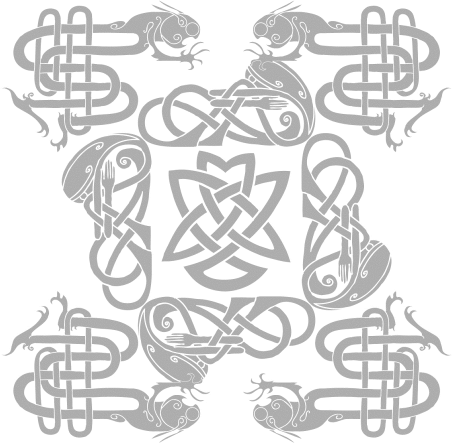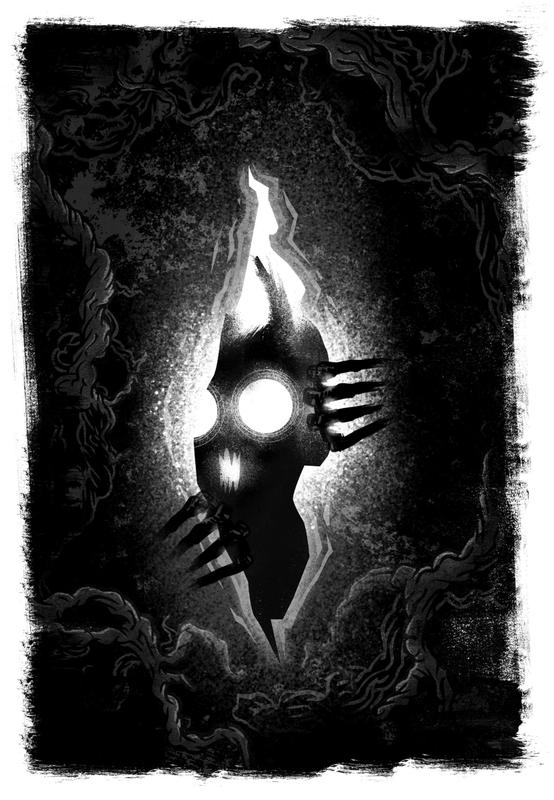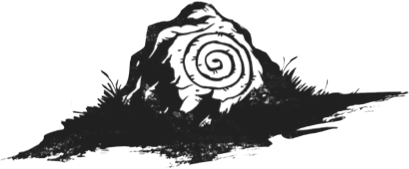A Cage of Roots
Authors: Matt Griffin



For my girls

I would like to thank Michael O’Brien, Emma Byrne, Susan Houlden and all at the O’Brien Press for taking a punt on me; my parents, brothers, sisters-in-law and friends for their constant encouragement and, most of all, my wife, Orla, for her endless faith and patience.


- Title Page
- Dedication
- Acknowledgements
- Chapter 1 - A Lingering Nightmare
- Chapter 2 - An Empty Bed
- Chapter 3 - A Stifling Cell
- Chapter 4 - An Audience with Ancients
- Chapter 5 - A Spiralling Path
- Chapter 6 - A Bright Light in the Deep Earth
- Chapter 7 - A Door in Time
- Chapter 8 - A Map Misread
- Chapter 9 - A Weave of Roots
- Chapter 10 - A Test for Treasure
- Chapter 11 - A Secret’s Bite
- Chapter 12 - A Battle Below
- Chapter 13 - A Song of Goodbye
- About the Author
- Copyright


A
yla was having a nightmare. The most vivid, horrifying nightmare.
She woke because she could not breathe. She was in stifling, hot darkness; like when you fall asleep with the heat on but a hundred times worse. What little air there was tasted of mud, and the darkness was absolute. Her room was never this dark. She couldn’t even see her hand in front of her face.
There was something else too that made her realise this wasn’t her own room. She could sense the closeness of the walls. Even though she couldn’t see, she knew that where she was lying was small and tight; when she reached out her fingers she found the walls around her all too quickly. Her nails scratched at hardened muck, and the dust hissed as it fell from her touch to the rough, cragged floor. She started to grope blindly and frantically, and tried to stand
too quickly, banging her head painfully on the low ceiling. She could only hunch. A tremor of panic grew deep in her stomach as she searched for an opening but found none. She covered every centimetre again and again, finding that she could move just less than a metre on either side and never stand to her full height. The desperate search sucked the adrenaline from her and she stopped, spent, and lay against one of the walls.
So, she decided, she was in the middle of the worst nightmare she had ever had: a horribly realistic, graphic one of being buried alive. All she had to do was clench her eyes shut, as tight as she could, and go back to sleep. But sleep just wouldn’t arrive, and she couldn’t escape the feeling that she was just about to run out of air. It was so uncomfortable, and the hard, knotty ground she lay on was just too real. As Ayla slowly accepted her situation as fact, her screams for help morphed to sobs in the blackness.
She felt that there was no sense of time in this waking grave, but it seemed like she had been crying for hours. Her throat was raw from shouting for help, and her chest ached from heaving. Her hands and feet hurt too, from kicking and lashing at the walls.
When she accepted defeat at last, and lay jolting with those sharp breaths you can’t help but make after crying, rational Ayla began to wake. She told herself:
lying here
sobbing is going to get me nowhere
. Punching walls of muck and stone wasn’t particularly helpful either. She had to think – to cast her mind back to every single minute of the day and try to guess how she had come to be buried alive. Did she fall? Ayla loved to walk in the woods. Maybe she had tripped into a ditch or badger hole and the memory of it was knocked out of her? She did her best to calm herself and recall the steps of her day, starting with a rushed breakfast with her beloved uncles.
Breakfasts were always eaten in panic, because Ayla always overslept. Every school day played out the same way too: Uncle Lann, cross and rushing her; Uncle Taig, tutting sarcastically and winking; and Uncle Fergus, himself a sleeper, dropping off again at the table. Thinking of her uncles helped ease the worst of the terror. She indulged the memories, lingering in their warmth.
They were her only family. The day they rescued her was still so clear four years later: they pulled her from the torment of St Sophia’s Holy Home for Girls in New York State. Before that day she did not even know she had any family at all, let alone that they, and therefore she, were as Irish as spuds. Lann, Fergus and Taig were giants of men, each as tall as two-and-a-half metres. When she was called out of the blue to the cold visitors’ room, they were there, stooping under the ceiling. Straight away they sent beaming smiles Ayla’s way and she would never forget the look
of defeat in the sisters’ cruel faces. She would have leapt into a tiger’s arms to get away from those nuns, but three hulking goliaths from an island she had barely heard of? It was nearly a more frightening prospect. It took more visits, and a lot of talk, before she would trust them. In the end, it came down to a simple choice: stay incarcerated with the sisters, or leave for a new adventure in Ireland. The day they drove away and St Sophia’s faded into the distance was still the most magical of her life. The long flight over the Atlantic was a rebirth, plain and simple, from despair to hope.
Underground Ayla bit her lip and focused.
This morning was no different than any other,
she thought.
Breakfast was only half-eaten. I ran out the door with toast hanging from my mouth, and we sped off in that dirty old jeep. Fergus’s snoring was louder than the engine, like always. And I was dropped at the school gates with only a minute to spare before the bell, like always.
It was so hard to get comfortable in the blackness, thinking back got more difficult with every minute. Even warm thoughts of saying farewell to St Sophia’s were no match for the rocks and twigs that were now knuckling into her back. But sharpening her thoughts was essential; piecing together the day should, must, reveal some clues as to how she got here and how she could get out. So Ayla calmed herself again, sucked in a sip of stale air, and brought her mind back to the morning, and the first hours of school.
She had just avoided Mrs Marnagh, the principal, and made it to her first class before everyone had settled in their desks. Sean and Benvy sat tapping their watches and grinning, by now a morning ritual. She threw her eyes to heaven, smiled, and took her seat at the opposite end of the classroom. Ayla had long been separated from them because of their fondness for talking, laughing and distracting each other as much as possible.
That morning, Irish was their first class: a favourite. While there was no joy for her in history or geography, Irish was something she was good at. It just came naturally to her, albeit with a mild New York twang, and it helped that her uncles insisted on speaking it to her at home. That morning, she remembered, Mr O’Ceallaigh was writing on the whiteboard, but she was engrossed with something outside. She noticed a harmless movement in the bank of trees across the pitches: just wind making the leaves dance. But it looked so strange. The leaves made lithe shadows that scurried like a troop of skinny baboons, leaping through the branches. They were so realistic she had laughed out loud.
She rubbed her eyes and opened them to find that Mr O’Ceallaigh had stopped writing and was staring at her. She was sorry because she liked him, but allowed herself one more glance to confirm that leaves were just leaves and wind was just wind and her head was just having fun with
her, as it so often did. The trees swung, fanned by the late autumn breeze – and there was no sign of any baboons leaping through the branches!
The rest of the day, as far as she could remember, went by without incident. She strained to think of anything out of the ordinary, but nothing really of note had happened. It was Wednesday, and that meant finishing off with the Seventh Hell of double-maths. Double-maths always seemed like a time-stretching purgatory of dullness, where even clocks seemed to fall asleep, and Mr Fenlon’s voice became like the drone note on Taig’s uilleann pipes. At last, after an age spent confused by Xs and Ys, the bell went and it was time for home.
Now Ayla really had to concentrate because, despite her best efforts, the memories from this part of the day seemed to dance around like moths, impossible to hold. She squirmed on the rugged floor, stamped her feet in frustration, and had another bout of tears. But this was Emotional Ayla fighting for dominance, and she forced Rational Ayla back into the driving seat. ‘Calm, Ayla,’ she said aloud, and repeated the words until the sobbing stopped.
She had messed around with Sean and Benvy at the wall beside the parking area. They were jostling about, play-fighting: a blessed relief from maths-boredom. Sean was playing ‘Poke the Tiger’ with Benvy, holding his finger just
a few centimetres from her face. Benvy, at nearly twice Sean’s size and with a fuse a tenth as long, was an easy target. Ayla was distracted by the noise of the wind in the leaves. It seemed so loud. Like every single leaf was shouting at her. She was snapped out of it when Sean knocked her over onto the grass, launched by an angry Benvy. He had committed the mortal sin of teasing her about her size – the one thing she could never stand – and Sean was punished accordingly.
We were all laughing about it, though. They got on their bus and I walked. Just a normal day
.
Was this when I went to the woods?
She often took a detour through Coleman’s Woods, as it edged onto the back of her house. She loved those cool minutes in the whispering green trees. It gave her time alone to let her mind drift. In her own company she was never the ‘different one’. Ayla the Yankee. Ayla the orphan. Ayla the big fellas’ niece. She was just Ayla. But she had not taken that route this time. She remembered now, she had felt so
tired
. Not just sleepy but … weary. Spent, even. It was such a strange feeling.
So this isn’t a badgers’ set or a dark ditch, and I haven’t just slipped in the woods and hit my head
. That was not good news, for there went the most plausible and normal explanation. All that was left was fear.
At least she knew now that this option was off the cards. She could move on in her memories to the next step: the walk home. And, yes, here things became clearer, briefly.
The walk through her hometown of Kilnabracka took her away from Main Street to John’s Lane and past Daly’s sweet shop, but she didn’t go in, for once. Up on Synge Hill, she walked past the rows of tiny bungalows where old ladies lived, but were never seen. It brought her down to Lee’s Valley Road, where her estate, Rathlevean, and two other estates her uncles built, edged up the next hill. She was too tired to notice the wind had picked up in the branches of Coleman’s Woods, beyond the houses. She went straight over to her road, trudging now and dragging her feet with fatigue. She lifted the key to the door, shaking off a momentary relapse into her ‘monkey’ daydream when the wind made funny shapes resembling baboons in the big sycamore leaves. She threw her bag under the stairs, and on her way up to her room decided to ignore a text from Finny, and just collapse into bed. The memory stopped before her head was halfway to the pillow.
A spark ignited: a flash of a thought. Her stomach fluttered at the prospect. My phone! Frantically, desperately, she fumbled about her pockets, patting herself down, cursing at every empty pocket until – there in her back pocket! What she had mistaken for a rock or branch digging into her was her phone. Sobbing again, this time with relief, she pulled it out and pressed the button. The screen lit up. But almost as quickly, just long enough to see there was
no signal, the device beeped once and slipped into darkness, along with her hope.
Ayla just lay there then, staring into nothing. Time loped along half-dead again, until from something (her phone? No, it was the wrong kind of glow) light appeared again. A chink of orange in the blackness by her feet, and it grew. Struggling to sit up and not knowing whether to laugh, cry, scream or sing, she watched the glow spread, and the chink widen. But instead of some friendly Garda’s hand, or, please God, a great hairy ham of an uncle’s paw, something totally different blocked the light. It froze her blood.
Obstructing the glow, suddenly, was a head, but such a strange one – a horrible one: black with two bulbous, glowing white eyes. Ears darted out either side like wrecked kitchen knives, and the mouth? When it opened, it was like looking into a furnace, burning red, stinging her eyes. And it spoke, or made a sound anyway. A sound like metal dragged on stone, and a long, thin, twisted claw of a hand reached in to drop something at her feet, something that smelled of rotting leaves, and withdrew. The hole snapped shut, and Ayla was left again in pitch, hot blackness, too stunned to cry.

